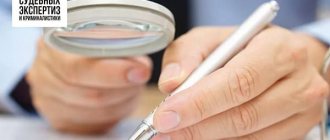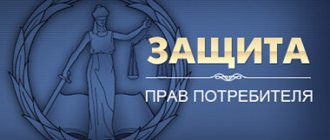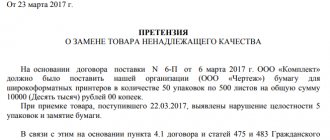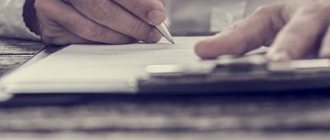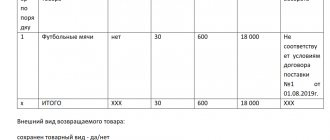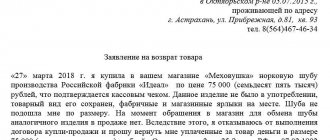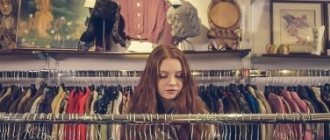An independent merchandising examination is carried out in order to establish the quality of the purchased product and, if necessary, return it or exchange it from the seller.
In cases where the seller refuses to recognize the defect of the goods as significant and return the money or exchange the low-quality goods, the buyer has the right to conduct an independent examination of the quality of the goods.
Based on the Federal Law “On the Protection of Consumer Rights,” a citizen has the right to a refund of the full cost of the examination performed.
As a result of the examination, specialists from the National Research Center “Capital Expert” will prepare a reasoned conclusion from a commodity expert, indicating all existing shortcomings and defects of the product, photographing them and describing the research methodology.
The conclusions of the expert opinion will allow you to recognize the product as defective and return the money by resolving the dispute at any stage of the pre-trial proceedings.
Select an area of commodity research from the list below and find out in more detail about the methodology for conducting commodity examination of non-food products.
When is expertise needed?
Sometimes it is unclear whether a product has a defect or not.
For example, a man bought a set of kitchen furniture in a store, and already at home he discovered a stain on one of the cabinets that caught his eye. According to the seller, this is not a defect, but a shade created by the structure of the wood. The buyer insists that this is a drawback - the furniture does not meet quality standards. Or it happens that the defect is obvious, but a dispute arises as to who is to blame: the defect arose before the goods were transferred to the buyer or the buyer himself damaged the goods. Such disputes especially often arise regarding technology. For example, if a laptop does not work, then it could initially have a manufacturing defect, but the buyer may have flooded it with something.
In both cases, when a dispute arises, an examination is necessary. The procedure for its implementation is prescribed in paragraph 5 of Art. 18 of the Law on Consumer Rights.
Who pays for the examination
If a defect is discovered within the warranty period, the seller pays for the examination of the goods. But if it turns out that defects in the product arose due to the fault of the buyer, he will be obliged to compensate the seller for the cost of the examination. And in addition - the costs of storing and transporting goods.
Keep all documents related to the examination. They will be needed if the store collects expenses from the buyer.
If a defect is discovered after the expiration of the warranty period, but within two years from the date of sale of the goods, then the buyer pays for the examination. If the examination shows that the defect arose before the sale of the goods, that is, the defect is manufacturing, the seller will have to compensate the buyer for the cost of the examination - clause 5 of Art. 19 of the Law on Consumer Rights.
If the seller does not satisfy the buyer's demands, he can go to court, and he will collect much more from the store.
A woman bought leather shoes in a store and later discovered that the sole of the right one had become unstuck. The warranty period had expired at the time the defect was discovered.
The buyer applied to the store for a refund for the shoes, but was refused. She conducted an independent examination, which showed that the defect was of a manufacturing nature.
The woman again filed a claim with the store for a refund of the cost of the shoes and reimbursement of the cost of the examination, but did not receive a response, so she went to court.
The court agreed with the conclusions of the examination and recovered from the store:
- the cost of the shoes is 43,950 ₽,
- expenses for the examination 5,000 ₽,
- penalty 25,000 ₽,
- expenses for paying for the services of a representative 5,000 ₽,
- postage costs 1,230 ₽,
- costs for copying services 470 ₽,
- expenses for notary services 2,040 ₽,
- compensation for moral damage 1,000 ₽,
- fine 20,000 ₽;
- state duty 2,568.5 ₽.
So, instead of 48,950 rubles, which the customer asked to reimburse in the claim, the store had to pay 106,258.5 rubles.
Case No. 2-9698/2017 (16)
Who to contact for expertise
To conduct an examination, you can contact either a government organization or a private company that understands the specifics of a particular product.
To assess how well a product meets quality standards or who is to blame for its deficiency, an expert must have knowledge and experience. It is better to contact reputable companies that have already established a business reputation. But if this is not possible, then when contacting the company, check the diplomas and certificates. If it turns out that the expert is not sufficiently qualified, then his conclusions may be challenged by the party against whom the expert opinion will be issued.
If the case comes to court, and the court doubts the conclusions of the examination, it will order another examination.
Product examination must be independent. That is, the expert’s conclusion should not be influenced by either party to the dispute about the quality of the product.
Some stores turn to the same experts and sometimes negotiate with them to draw up an opinion in their favor. But the buyer may not agree with the results. I’ll tell you what follows next.
How to conduct an examination upon acceptance of goods
Before accepting goods, works or services, the customer must check whether they comply with the requirements of the contract. To do this, he conducts an examination.
Moreover, if within the framework of one contract the supplier makes several deliveries, each of them needs to be checked.
For example, a poultry farm entered into an annual contract for the supply of feed for chickens. According to its terms, the supplier must supply goods monthly. This means that for each of the 12 deliveries the customer must conduct a separate examination.
When the customer signs the acceptance document, he confirms that the goods, work or services comply with the requirements. Therefore, if he does this before conducting the examination, he will not be able to make a claim against the supplier. The only exception is some goods or services that can only be valued through consumption. For example, apartment renovation or road construction.
What to check when accepting goods, works or services
For each purchase, the customer can set his own verification criteria. Experts can check all goods - this is called a complete check - or select only some of them. Spot checks are most often carried out for large deliveries, for example, when purchasing two tons of office paper, experts will not check every sheet, but will take several of them from different packages for testing.
At the same time, experts look not only at the quality of the product, for example, whether it complies with GOST or technical specifications, but also at its configuration and quantity. They also check whether the supplier has provided genuine certificates or licenses.
For example, when accepting goods, experts pay attention to:
- packaging integrity,
- marriage,
- transportation conditions,
- expiration dates,
- accompanying documents,
- certificates and licenses.
There are two types of examination: external and internal. The customer decides which one to carry out independently.
How to conduct an external examination
To conduct such an examination, the customer engages third-party expert organizations or individual experts. He must conclude an agreement with them and indicate in it:
- requirements for experts,
- inspection deadlines,
- methods by which it should be carried out,
- forms of acceptance documents,
- expert responsibility,
- cost including taxes and fees.
All costs for attracting external experts must be borne by the customer. He cannot include them in the contract price.
Who can conduct an external examination
The customer can involve both an individual and a legal entity in such an examination. The government has prescribed in the law a list of requirements for external experts. They cannot be:
- former employees who worked for the company less than two years ago;
- organizations or experts that have property interests or can exert pressure on the customer;
- close relatives, for example, parents, brothers and sisters, even half-bloods, or spouses;
- organizations that have more than 20% of shares, deposits or interests in the supplier or customer company;
The customer can also set his own requirements for the expert, for example, his education or work experience.
If the expert does not meet the requirements of the law or the contract, the customer must replace him.
How to conduct an internal examination
In this case, the audit is carried out within the company: by one employee or by a commission of five or more people.
Before conducting an examination, the customer must sign an order which lists:
- names and positions of those responsible for conducting the examination: one employee or commission;
- their responsibilities;
- methods by which verification should be carried out;
- inspection deadlines;
- procedure for detecting deficiencies.
Such an order can be valid only for one purchase or for several purchases at once.
Who can conduct an internal examination
There are no requirements for the education and position of internal experts. The customer can create a separate commission for this, or entrust the inspection to any employee, for example, a contract manager.
What to do with the results of the examination
Based on the results of the inspection, experts draw up a conclusion. When conducting an internal examination, this conclusion can be included in the acceptance documents, but when conducting an external examination, a separate document must be drawn up for it.
In conclusion you need to indicate:
- who conducted the examination
- verification criteria,
- whether the goods or services meet all requirements,
- violations if identified by an expert.
If the examination reveals violations, the customer can send a request to the supplier to eliminate the deficiencies within a certain time frame. He can also terminate the contract unilaterally if he has specified such a condition in it. In this case, he must publish his decision in the EIS and notify the supplier about it within three days.
However, if the customer has identified violations for the first time, the supplier may correct them within ten days after notification. In this case, the contract cannot be terminated.
If the goods or services have passed the inspection, the customer can sign the acceptance certificate. This act must contain:
- a list of goods, works or services purchased by the customer;
- their cost;
- conclusion of the examination with documents and conclusions;
- signature of the expert or commission representative.
Responsibility for the results of the examination
External experts who review goods, works or services are responsible for their decisions. For example, if an expert issues a false conclusion that causes damage to the supplier in excess of 2.25 million rubles, he may pay a fine of up to 300 thousand rubles.
If the damage is small, such a fine will range from 30 to 50 thousand rubles for individuals, and from 100 to 150 thousand rubles for legal entities. Sometimes courts prohibit experts from engaging in procurement for six months or even a year.
The customer is also responsible for acceptance. For example, if he does not draw up an acceptance document, or refuses to sign it without good reason, he may be fined up to 20 thousand rubles.
The court may issue such fines within a year after procurement participants or experts commit a violation.
To quickly organize procurement without errors, use the service for government customers Kontur.Snab.
He will select current codes in the OKPD-2 and KTRU classifiers, calculate the NMCC and plan the procurement time frame. More details
Can a store limit itself to self-checking quality?
Sometimes sellers believe that they can assess the quality of the product themselves and not contact an independent expert. But the Consumer Rights Act prohibits this. The store can first evaluate the product itself, but if the buyer stands his ground, he will still have to go to an expert.
The man returned the car to the store for warranty repairs due to discovered defects. When braking, the car creaked, knocked when driving over uneven surfaces, and periodically suddenly stalled.
The store conducted a quality check of the car, the results of which did not confirm the stated deficiencies.
The following month, the buyer wrote a second appeal, in which he expressed his disagreement with the car inspection report issued by the store and pointed out the presence of previous deficiencies.
Following a buyer’s complaint, Rospotrebnadzor came to the entrepreneur. The inspection confirmed that the store violated paragraph 5 of Art. 18 of the Law on Consumer Rights - did not conduct an examination of the product at his own expense. The store was fined 10 thousand rubles. according to Art. 14.15 Code of Administrative Offenses of the Russian Federation. The court agreed with the result of the check - and the dispute with the car buyer continued.
Case No. 01-AP-4917/2020.
Features of the return of food products
Warranty car repairs: terms, guarantees, documents for registration. Tablet warranty repair - .
Violation of warranty repair terms - .
Food products must be returned to the store if they are of inadequate quality. According to Russian legislation, high-quality goods will not be accepted by the seller.
Based on Article 503 of the Civil Code of the Russian Federation, even if the buyer managed to partially use the product, the store is obliged to return the money spent on the purchase in full.
The seller refused to exchange low-quality products or return their cost? If you are convinced of the low quality of the product, contact the Rospotrebnadzor technical department with it and a receipt confirming the fact of purchase.
Employees of the authority will check the goods free of charge as soon as possible and bring the violator to justice.
Duration of the examination
The examination of the goods is carried out within the same time frames that are provided to satisfy the buyer’s requirements, which he states when returning the goods. The period is counted from the moment the goods are returned and the goods return certificate is signed.
| Requirement | Examination period | Consumer Rights Law |
| eliminate product defects | As the period for eliminating deficiencies under the contract (no more than 45 days). Immediately, if there is no deadline in the contract. | Art. 20 |
| replace the product | within 20 days | Art. 21 |
| return money, make a discount, compensate for losses or repairs | within 10 days | Art. 22 |
What questions to ask the expert
It is better to prepare the questions that you will need to ask the expert in advance. The more clearly the questions are formulated. the more accurate the expert’s conclusion will be.
The cost of the examination depends on the number of questions - the more questions, the more expensive it is. Sometimes two questions are enough to conduct an examination: whether the product has a significant defect and whose fault it arose. But the questions raised should be enough to resolve the dispute with the buyer
What happens if the buyer does not agree with the results of the examination
If the buyer does not agree with the conclusions of the examination, he can challenge it in court. In this case, the buyer can turn to another expert, bring his opinion to the court, and include the costs of the examination in the amount of the claim. Or the buyer will ask the court to conduct a re-examination.
If the store evades participation in the examination ordered by the court (does not provide the experts with the goods or the necessary documents), then the court may recognize the fact that the goods were sold defective - clause 3 of Art. 79 Code of Civil Procedure of the Russian Federation.
If the court makes a decision in favor of the buyer, all costs of the examination carried out by the buyer or ordered by the court will be recovered from the store.
The article is current as of 08/04/2021
Research is:
- Member of the "Chamber of Commerce and Industry of the Russian Federation"
- member of the Anti-Corruption Charter of Russian Business
- Member of the SUDEX Chamber of Forensic Experts named after Yu.G. Korukhova"
- Member of the NP "European Bureau of Forensic Experts"
- has a quality certificate GOST R ISO 9001-2015 (ISO 9001:2015)
- recommended as an expert institution by the Arbitration Courts of the Russian Federation,
- is one of the leading institutions in the field of conducting commodity examinations on the territory of the Russian Federation
The office and laboratory are located in the center of Moscow, near the Kurskaya metro station; if necessary, an expert can travel to the customer. Opening hours from 9.00 -20.00 daily, expert on duty - 24 hours a day by phone.

